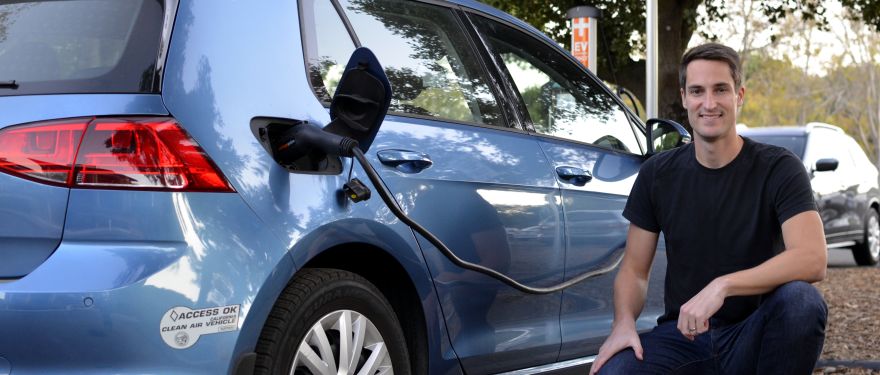Established in 2010, the HBS Business & Environment Initiative (BEI) works to deepen understanding of the environmental challenges facing business leaders and inspire new ideas and practical, effective solutions. BEI has established a network of 5,000 alumni whose careers include managing business & environment opportunities and risks. BEI helps to connect current MBAs with these alumni for learning and careers. We recently spoke with one such alum about his career journey.
For the first part of his career, George Hart (MBA 2017) worked as a researcher at LMI Government Consulting and the RAND Corporation, offering big-picture insight and analysis to a range of clients in the US government. Satisfying as that work was, he knew he wanted to pursue a more hands-on role in the clean tech space. Here, he describes his path to HBS, where he acquired the tools and contacts that helped him move on to an operations management role at an early-stage battery startup.
Tell us a bit about your background before you came to HBS.
I studied industrial engineering as an undergrad, and ended up doing a master’s degree in that area as well. After that, I spent seven years doing operations research, helping military leaders and policymakers think about how to make government more effective and efficient. It was an advisory, analytical role, and I enjoyed it very much—but after a while it felt a little too removed from the action. I wanted to get closer to the implementation end of the spectrum, which was part of what drove me to enroll in the MBA program.
What influenced your decision to go into clean tech?
I’m definitely passionate about the environment and interested in finding ways to contribute to solutions to our environmental challenges, particularly climate change. And given my background as an industrial engineer, I looked at roles that had an operations flavor to them. I also realized I really enjoyed inventing things; one of the aspects I had enjoyed most about my work as an analyst was how unstructured it was: if I was going to write an algorithm as part of some analysis, it was up to me what that would look like. I wanted to contribute to an organization that, in terms of its maturity, was still trying to figure out how it was going to work. Essentially, I wanted to invent the operating model that would help power the business model. That drove me toward smaller, younger companies that were still figuring things out.
Can you tell us about where you ended up?
One area of focus in my job search was companies working on the electrification of vehicles; currently I’m the operations manager at an early-stage battery startup based in the Bay Area.
What do you do on a day-to-day basis?
It varies quite a lot. In general, I’m focused on thinking about how we’ll scale up our production, first to make more prototypes, and eventually to the point where we are a mature company with products coming off the line. I manage our relationships with suppliers and equipment manufacturers. I also try to make sure there’s coherence across the organization in terms of operations, planning, and strategy, because we have many different teams, each of which is focused on its particular aspect of our product; part of my job is to ensure we’re all working off of the same shared assumptions about where the company will be in six months or a year.
How can students best familiarize themselves with different career areas and job functions within renewables and clean energy?
There are several venture capital firms with funds focused on these areas, so looking through their investment portfolios is an interesting way to find early-stage companies working in the clean energy space. It’s also easier to reach out and ask questions as a student—people are generally pretty generous with their time when they hear you’re still in school. I would also highly recommend the treks organized by the Energy and Environment Club that go into Boston or out to Silicon Valley. Over the course of a day you might visit six to eight companies…it’s extremely efficient exposure to a bunch of different players. Those are a great way to interact with recent HBS alumni and get a real sense of what their day-to-day experience looks like. Finally, faculty can be a great resource for learning about opportunities in the space. I was a student advisory member for the Business and Environment Initiative, which gave me the opportunity to interact with faculty with an interest in that area, but I also made a point of meeting with professors one-on-one to get their perspective on where the emerging opportunities were.
Do you have any advice for incoming MBAs with an interest in business and the environment?
I spent a good chunk of my career working to improve public policy, so obviously I believe in that route as a pathway to change. But change can happen even more quickly when businesses make it economically attractive to do the “right” thing. For example, if we can help make electric cars more affordable than gasoline-powered cars, people will happily choose the better, competitively priced vehicle that also happens to be better for the environment. I was drawn by that premise to work at a company that I felt had a reasonable shot of achieving that kind of impact. While I definitely consider myself fortunate to have found a role that fits my interests well, doing so is actually easier than a lot of students think. There can sometimes be this belief that you have to choose between working on something that really matters to you and doing something that is good for your career. As an HBS graduate, you have access to opportunities to do both, particularly if you look beyond the more typical career paths. So I would encourage students, no matter their passion, to really seriously consider these types of roles, especially at startups.

